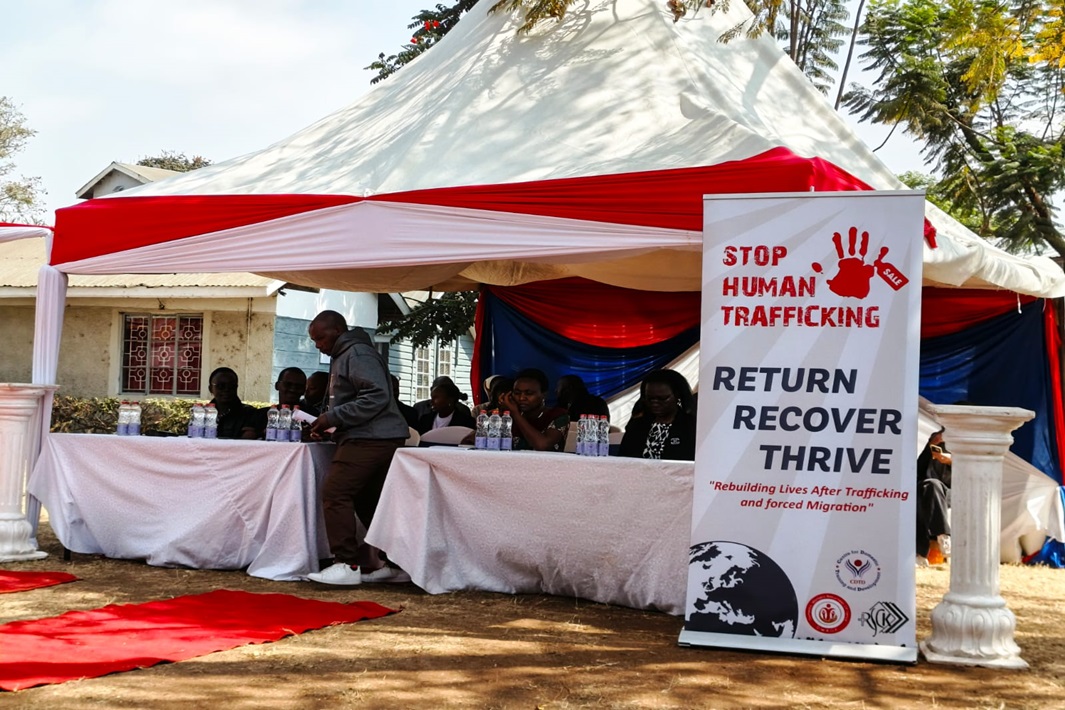Kenya joined the rest of the world on Friday to commemorate the World Day Against Trafficking in Persons, with survivors, civil society organizations, faith groups, and government representatives converging in Nairobi to highlight the plight of returnee migrant workers and push for coordinated support systems.

The event, organized by the Centre for Domestic Training and Development (CDTD) in partnership with other stakeholders, brought together dozens of survivors of human trafficking, many of whom have returned to Kenya after facing exploitation abroad.
“We came together as partners to give back to the returnees,” said Edith Murongo, founder and executive director of CDTD. “These are people who have been repatriated, returned voluntarily, or completed their contracts. Today was about celebrating them and working towards a more holistic reintegration process.”
Murongo emphasized the need for collaboration between government agencies, civil society, the church, and survivor networks to ensure that returnees receive the necessary psychosocial, legal, and economic support.
“There is no single organization that can provide all the services needed,” she said. “That’s why we’ve united — to offer collective support.”
A major theme that emerged from the event was the widespread lack of awareness on safe labour migration, especially among rural and marginalized communities. Murongo said this information gap continues to leave many jobseekers vulnerable to traffickers and unregulated agents.
“There is a lot of information in Nairobi, but it rarely reaches the grassroots — the villages, the estates, the Number 10s,” she noted. “Families are still being lured by brokers due to misinformation and desperation, only to end up trapped in exploitative situations.”
She called on the government to launch a nationwide awareness campaign targeting jobseekers, parents, and youth, saying such efforts must be properly funded and sustained.
Diplomatic Support Remains Weak
Returnees at the event also raised concerns over the lack of assistance from Kenyan embassies, particularly in the Gulf region, where many migrant workers face abuse. Murongo echoed these concerns, pointing to an overstretched diplomatic presence in countries like Saudi Arabia.
“Saudi Arabia is massive — the size of Kenya, Uganda, Tanzania, and more combined — yet Kenya has only one labour attaché there,” she said. “There was a proposal in Parliament to increase the number to at least seven, but that never materialized. The few officers on the ground are overwhelmed.”
She stressed the urgent need for the government to expand its consular presence and responsiveness to better protect its citizens abroad.
A Call for National Commitment
The event concluded with calls for a more coordinated national approach to addressing trafficking and supporting returnees, including improved legislation, better inter-agency cooperation, and survivor-centered policies.
“This is not just a commemoration. It is a call to action,” Murongo said. “We must ensure that returnees are not forgotten, and that Kenyans seeking work abroad do so safely and with dignity.”
The World Day Against Trafficking in Persons is marked annually on July 30, but stakeholders in Kenya held the event earlier to accommodate survivor participation and broader engagement.






